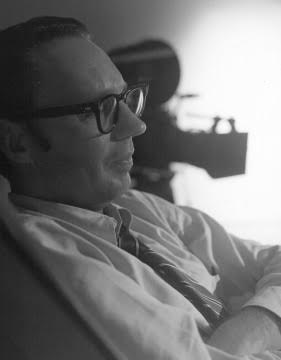Jim Case facts for kids
Quick facts for kids
Jim Case
|
|
|---|---|
 |
|
| Born |
James W. Case
June 18, 1927 |
| Died | March 19, 2012 (aged 84) |
| Alma mater | University of Denver |
| Occupation | Television and film director and producer |
| Employer | KRMA-TV, NBC, CBS, KCET, Sam Lusky Associates, and KPBS |
|
Notable work
|
The Ragtime Era, Redman's America series, The Naturalists, The Glory Trail, and Artists in America: James Salter |
| Spouse(s) | Elizabeth Case |
| Children | 1 |
James W. Case (born June 18, 1927 – died March 19, 2012) was an American director and producer for TV shows and movies. He helped create many programs for big networks like NBC and CBS.
Jim Case is best known for directing The Ragtime Era. This was a popular TV series from 1959. He also directed other educational shows like Redman's America and The Naturalists.
Contents
Early Life and First Jobs
Jim Case was born in Kansas City, Missouri, on June 18, 1927. He joined the United States Army and worked as a medic in Germany. This was at the end of World War II.
After the war, he went to college. He studied at the University of Kansas City. Then, he graduated from the University of Denver in 1950. He earned a degree in Radio and Television.
At the university, he met a professor named Noel Jordan. Jordan used to be an executive at NBC. Jordan suggested Jim apply for a job at NBC in New York City.
Jim got a job as an NBC Page. This meant he learned how things worked at NBC. After almost a year, he got a full-time job. He worked on shows like Howdy Doody and Your Show of Shows.
Career in Media
In 1954, Jim Case moved to Los Angeles, California. He worked at CBS Television City for a short time. He soon realized that this job wasn't for him.
So, he went back to Denver in 1955. He taught a TV Production class at the University of Denver. He then found out about a new TV station starting in Denver.
Starting KRMA-TV
Jim Case became the director of KRMA-TV. This was Denver's first educational TV station. It is now known as Rocky Mountain PBS.
KRMA-TV started broadcasting on January 30, 1956. It began in a small studio. This station became a leader in educational TV.
The Ragtime Era
While at KRMA-TV, Case directed many educational programs. One of his biggest hits was The Ragtime Era. This was a 12-part TV series from 1959.
The show featured pianist Max Morath. He was from Cripple Creek, Colorado. Max used music and stories to teach about American history.
The Ragtime Era was special because it mixed fun with learning. This made it popular with many viewers. By 1960, the show was shown on the National Educational Television (NET) network. This network had over 50 stations.
It was the first show from KRMA-TV to become famous across the country. Many people said Jim Case was key to KRMA's success. He helped the station become a leader in public television.
New Projects and Films
In 1964, Case left KRMA-TV. He moved back to Los Angeles. He became the first program director for the NET station, KCET. He produced films about famous people like Jean Renoir.
Later, he worked with KPBS in San Diego. There, he produced many documentaries for public TV. In 1966, Case returned to Colorado. He worked for an advertising company.
He directed a short film called Robbie and the White Bike. It was about a boy exploring Denver on a bike. The film won awards and was well-known.
Circle Films and Documentaries
In 1969, Jim Case started his own company, Circle Films. He planned a documentary about Christopher Columbus's ship, the Santa Maria. But the project stopped when they couldn't find the ship.
Case then produced a film about James Salter. Salter was a well-known writer and director. This film was part of the Artists in America TV series. It aired on KRMA-TV in 1971.
After that, Case created a four-part series called The Naturalists. It was about famous American naturalists. These included John Burroughs, John Muir, Theodore Roosevelt, and Henry David Thoreau.
Case and his team traveled across the country to film. They filmed in the places that inspired these four men. The Naturalists became very popular. It was rerun often, just like The Ragtime Era.
Later Life and Passing
In his later years, Jim Case lived in Colorado with his wife. He enjoyed playing golf. Even when he was over 80, he kept writing. He wrote essays about golf and children's books.
Jim Case passed away on March 19, 2012. He had prostate cancer. His work, films, and other materials from his long career are kept at the University of Denver.
 | John T. Biggers |
 | Thomas Blackshear |
 | Mark Bradford |
 | Beverly Buchanan |

